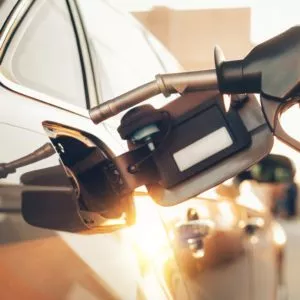Electric vehicles (EVs) are becoming more common with each passing year. They typically come in unique, boxy shapes that set them apart from gas-powered cars. While they’re better for the environment, some EVs are incredibly heavy, making them unwieldy to drive.
But are electric vehicles heavy enough to beat the weight of gas-powered vehicles? Similarly, how exactly does the weight of a vehicle affect its drivability?
Are Electric Vehicles Heavier Than Gas Cars?

Yes, electric vehicles are heavier than gas vehicles because of their large battery packs. These components typically weigh between 300 to 500 kilograms. In some electric cars, such as Tesla models, the battery is the heaviest component in the entire vehicle.
Typically, the bigger the electric car, the bigger the battery. The bigger the battery, the more powerful the vehicle. This means modern electric vehicles are getting heavier with each passing year as automotive benchmarks increase.
Why the Weight of Your EV Matters
While EVs tend to be around 30% heavier than gas-powered vehicles, that doesn’t stop them from getting you where you need to go. Despite that, weight does have an impact on car performance.
The Good
Driving a heavy vehicle comes with a lot of benefits. Typically, the more a vehicle weighs, the more stable and smoother it feels to drive. That also makes the vehicle more durable and long-lasting, which means they offer more protection during accidents.
Increased Stability
EVs are heavy, and depending on their weight distribution and center of gravity, this typically makes them more stable and easier to drive than lighter vehicles.
The heavier a vehicle is, the more force there is to keep its tires firmly on the road. More often than not, this means smoother, safer rides.
Strong and Sturdy Frames
Heavy vehicles are generally sturdier than lighter ones because they have strong frames capable of supporting extra weight. This means they’re less likely to get damaged in collisions and accidents.
Because of their size and weight, EVs are more durable and long-lasting, meaning you won’t have to worry about replacing your vehicle any time soon.
Additional Protection
Because heavier vehicles need stronger frames to support their own weight, they can also withstand a lot more punishment.
If you ever get into a minor accident while driving an EV, you’re less likely to get injured. Its size, weight, and the strength of its frame will protect you and your passengers.
The Bad
Some of the biggest downsides that come with driving heavy vehicles include their increased need for power and the risk that they can compromise roads and bridges. Some people also report that heavy EVs are hard to handle.
Needs More Power
It takes a lot to power a heavy vehicle. Though electric vehicles are generally more fuel-efficient than gas cars, power isn’t created out of nothing. Expect to make frequent trips to charging stations and spending lots of money recharging your vehicle.
Affects Roads and Bridges
Not all roads and bridges can accommodate incredibly heavy weights. That means EVs that weigh a lot can put a lot of strain on them. If you’re driving your EV across a bridge, be careful. Ensure the bridge can safely take the weight of your ride.
Hard to Handle
Another unfortunate downside of driving heavy EVs is that they’re much harder to handle than their lighter counterparts. Heavy vehicles don’t do well with slow turns and quick maneuvers. They’re also much slower to accelerate. These factors combined make heavy electric vehicles feel clunky and difficult to drive.
Are Hybrid Cars Heavier than Gas Cars?
Hybrid vehicles are typically heavier than gas vehicles because they have a lot more components. Their battery packs, in particular, significantly contribute to the weight difference.
Despite the fact that hybrids are usually heavier than gas cars, this isn’t true for all of them. Typically, the stronger the engine of the hybrid, the heavier its components and batteries are.
Where to Get High-Quality Hybrid Battery Packs Online
Hybrid battery packs or hybrid drive batteries are one of the heaviest parts of a hybrid vehicle. They’re a core component, but that doesn’t guarantee they’ll last the vehicle’s lifetime. After all, lithium-ion batteries can slowly lose their ability to hold charge. If you’re in the market for a new hybrid battery pack, why not order one online?
When it comes to EV or hybrid vehicle components, you might think you have no choice but to purchase expensive OE parts. Good thing CarParts.com has aftermarket options to open up your options.
All our EV parts are sourced from leading aftermarket manufacturers, so you can be confident in their performance and reliability. Our hybrid drive batteries undergo strict quality checks to ensure that they’ll function just like the original. Moreover, our strategically located warehouses let us ship your order quickly, so you can get your parts in as fast as two business days.
Don’t fret if your vehicle needs major part replacements. Shop for aftermarket hybrid drive batteries here at CarParts.com today!
Any information provided on this Website is for informational purposes only and is not intended to replace consultation with a professional mechanic. The accuracy and timeliness of the information may change from the time of publication.




















